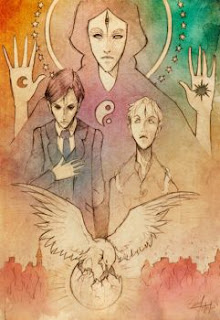Demian, Hermann Hesse
Dear Readers,
Have you read: Demian, written by Hermann Hesse?
Have you known Hermann Hesse?
Hermann Karl Hesse (1877 – 1962) was a German-born Swiss poet,
novelist, and painter. His best-known works include Demian, Steppenwolf, Siddhartha, and The Glass Bead Game, each of which explores an
individual's search for authenticity, self-knowledge and spirituality. In 1946, he received the Nobel
Prize in Literature.
A few months ago I watched one music
video which was inspired by this book and I really liked it so I decided to
read the book. This book had become my favorite book.
Emil Sinclair is a young boy raised
in a middle class home, amidst what is described as a Scheinwelt, a play on
words that means "world of light" as well as "world of
illusion". Emil's entire existence can be summarized as a struggle between
two worlds: the show world of illusion, and the real world, the world of
spiritual truth. In the course of the novel, accompanied and prompted by his
mysterious classmate 'Max Demian', he detaches from and revolts against the superficial
ideals of the world of appearances and eventually awakens into a realization of
self.
These passages are segments of the novel that best
demonstrate themes and lessons to be learned when reading Demian:
‘’If you hate a person, you hate
something in him that is part of yourself. What isn't part of ourselves doesn't
disturb us.‘‘
“I have been and still am a seeker,
but I have ceased to question stars and books; I have begun to listen to the
teaching my blood whispers to me.”
“I live in my dreams — that's what
you sense. Other people live in dreams, but not in their own. That's the
difference.”
“One never reaches home,' she said.
'But where paths that have an affinity for each other intersect, the whole
world looks like home, for a time.”
“Good that you ask -- you should
always ask, always have doubts.”
“I realize today that nothing in the
world is more distasteful to a man than to take the path that leads to himself.’’
“For the first time in my life I
tasted death, and death tasted bitter, for death is birth, is fear and dread of
some terrible renewal.”


Comments
Post a Comment